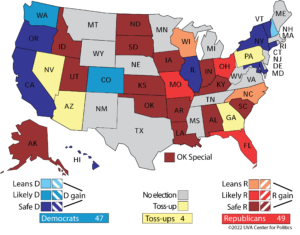At Politico, Burgess Everett spotlights Senator Elizabeth Warren’s ideas for Democratic midterm election strategy in the next few months: ““We’ve got nearly 200 days. If we don’t deliver, if we don’t get up off our rear ends and make it happen, we’re in real trouble,” the Massachusetts Democrat said in an interview in her office on Tuesday. “But if we do deliver, if we can get some tangible results that touch people’s lives, then we can go to the polls in November with our heads held high.”….She wrote a New York Times op-ed last week claiming Democrats are “headed toward big losses in the midterms” without delivering on their goals, sat for a lengthy Crooked Media podcast interview to push the party to make deals on issues it ran on in 2020, then did a rare three-network sweep on the Sunday shows….Warren is offering a prescription that’s in keeping with her policy-wonk identity during the 2020 primary. She wants anti-price gouging legislation and a ban on lawmaker stock trades on the Senate floor ASAP and quick work on a drug pricing and tax reform bill to wash away the bad taste of Build Back Better’s failure….she also wants President Joe Biden to cancel student loan debt, raise overtime pay and use executive actions to bring down drug prices. With the evenly divided Senate struggling to pass even a $10 billion coronavirus bill, it’s a tall order; still, Warren is pitching her revitalized agenda as a vital antidote to conservative framing of the election….She wants Democrats to put a bill allowing the Federal Trade Commission to investigate price gouging responsible for costly consumer goods and “dare the Republicans to vote against it. A clean, simple bill….Let’s put it to the Republicans. Do they care about price gouging from the perspective of helping the consumers?”
“As we assess the Senate map right now, we do currently see the Republicans as favorites to take the majority,” Kyle Kondik and J. Miles Coleman write at Sabato’s Crystal Ball. “This is because, of the most competitive seats — the ones we call Toss-ups — Republicans are defending just 1 (Pennsylvania) and Democrats are defending 3 (Arizona, Georgia, and Nevada). And while we’re holding at a Toss-up rating in all of these races, there are some indications that the Republicans are better-positioned in several if not all of them.” Kondik and Coleman provide a map reflecting the latest trends in public opinion:
Map 1: Crystal Ball Senate race ratings

Robert Kuttner takes a more optimistic view of Democratic midterm prospects for the Senate at The American Prospect: “Conversely, several Democratic pickups seem possible, notably the open seat in Pennsylvania, which Biden carried in 2020, as well as in Wisconsin, another Biden state, and where far-right incumbent Ron Johnson is a lightning rod for Democratic turnout. Elsewhere, Republicans face a divisive primary in Ohio, where Democrats have a strong candidate in Tim Ryan. In the open seat in North Carolina, a competitive state with a Democratic governor, Democratic chances depend on the degree of voter suppression. In Missouri, Republican incumbent Roy Blunt barely won the seat in 2016. Blunt is retiring, and the leading contender for the Republican nomination is Eric Greitens, who resigned as governor after accusations of abuse by a woman with whom he had an extramarital affair….The most serious at-risk incumbent is Raphael Warnock of Georgia, because of the degree of that state’s voter suppression. In New Hampshire, however, Sen. Maggie Hassan got lucky when her strongest potential opponent, Gov. Chris Sununu, decided not to make the race. In Arizona and Nevada, both blue-trending states, vulnerable incumbents Mark Kelly and Catherine Cortez Masto could well hold their seats given decent mobilization.”
From “Our commitment to Ukraine will be tested. Americans must stay strong” by Washington Post columnist Dionne, Jr.: “While the widespread solidarity with a people under siege is a refreshing break from cynicism and division, it’s easy to fly a flag and swoon over a fluent and courageous leader. It’s harder to stick with a commitment that will entail spending billions of dollars on behalf of a faraway people….Inevitably, some share of Americans will express sentiments that always arise about engagements abroad, even when no U.S. troops are involved: Why are we sending money to Kyiv and Odessa instead of Kansas City and Omaha?….The question should be taken seriously, and leaders of both parties will have to join in answering it convincingly. Remember how bipartisan support for the Marshall Plan after World War II was critical to its success. We and our allies must keep faith with Ukraine, even if the cost is high. The price of Russian success in subjugating Ukraine would be even higher, not only to Ukrainians but also to democratic countries everywhere. Aggression cannot be rewarded….Progressives are wary of throwing money at the Pentagon. They rightly argue that advocates of high levels of military spending typically turn around and insist on stringency when it comes to domestic needs, especially those of the least advantaged. Conservatives are often wary of foreign aid. And when they back big defense budgets, they never seem willing to increase taxes to pay for what they say we need….But in this moment of emergency for democracy, we must put aside our disharmony….The truth is that the United States is wealthy enough to do right by both Kyiv and Kansas City — and standing up for Ukraine now is an investment in a more secure future. The cost of bolstering Ukraine today pales in comparison to the price of allowing Putin’s treacherous adventure to succeed.”




The only long term response to inflation is energy security.
The only long term response to Russia, Iran, Venezuela and Saudi Arabia is energy independence.
The only long term response to energy security and independence also fights climate change.
Those Republicans that oppose climate change back inflation, Russia, Iran, Venezuela and Saudi Arabia.